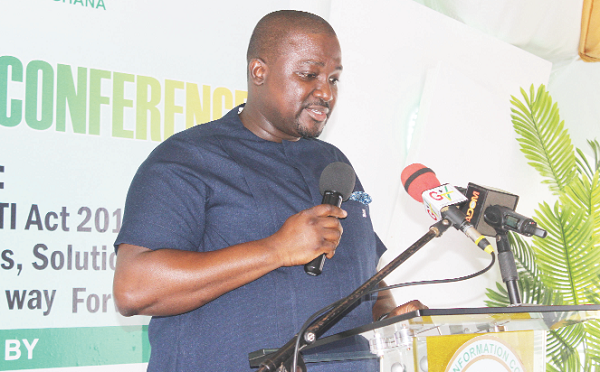
Bureaucracy impeding right to information - Panellists
Panellists at a stakeholder forum on the Right to Information Act, 2019, (Act 989) have identified bureaucracy at public institutions as the major impediment to the implementation of the law.
The stakeholders were of the view that many requests for information from public institutions delayed, mostly because of the bureaucratic nature of those institutions.
Advertisement
The panellists included the Executive Secretary of the RTI Commission, Yaw Sarpong Boateng; the Programme Manager at the Media Foundation for West Africa, Abigail Larbi Odei; the Executive Director of the Data Protection Commission, Patricia Adusei-Poku; the Director of the Access to Information Division at the Ministry of Information, Dr Winifred Nafisa Mahama; a board member of the RTI Commission, David Oppon-Kusi, and a former Executive Secretary of the Ghana Independent Broadcasters Association (GIBA), Gloria Hiadzi.
The stakeholder conference formed part of this year’s Right to Information Commission (RTIC) Week celebration.
It was on the topic: “Implementation of the RTI Act: Challenges, solutions, achievements and the way forward”.
Delays
Ms Odei, whose outfit has filed the highest number of requests using the RTI Law, explained that in one instance, a public institution refused to accept a request for information because the information officer had an accident and was on sick leave.
“One of the key challenges we see is that there is still that bureaucracy within the system and information officers need clearance to respond within 14 days to either get back to you or not,” she said in her remarks at the conference, which was moderated by the broadcast journalist and private legal practitioner, Samson Lardy Anyenini.
She, therefore, underscored the need for awareness obligation on the part of public officers to understand their roles as far as the operationalisation of the law was concerned.
Behaviour
Reacting to the issue, Dr Mahama said the issue of bureaucracy was behavioural, which would require considerable time to change among public office holders, adding: “We all know that behavioural changes are very difficult, especially in the public service where people are used to doing things in a way and are more comfortable doing that and getting protected by their sworn oath of secrecy.”
She noted that her outfit, through the Office of the Head of the Civil Service, the Local Government Service and the State Interests and Governance Authority (SIGA), had instituted measures to fast-track the process of responding to information requests.
The measures, she said, included reminding public officers of their responsibility and asking them to take note of the timelines for responding to requests.
The implementation of that, she said, also formed part of the appraisal system for heads of public institutions.
Mr Boateng affirmed the position, observing that one of the major challenges in the implementation of the law so far was the bureaucratic nature of institutions.
“When you write to an institution, it takes three weeks for the intended recipient to receive the letter, and sometimes there are 10 stages before it gets to the final recipient,” he said.
Deepen
Mr Boateng said to deepen the implementation of Act 989, the commission was currently working with the Ministry of Information to put before Parliament a draft legislative instrument for the further operationalisation of Act 989.
He added that a series of stakeholder engagements would be undertaken to receive inputs from a broad section of the public.
He further disclosed that the commission was finalising the setting up of a tribunal to adjudicate matters before it.
He said the RTIC was hopeful of receiving the necessary support to fully furnish the tribunal for commencement of work.
The Executive Secretary disclosed that the commission had successfully negotiated with the Attorney-General's Department to grant the RTIC prosecutorial powers to prosecute offences under the act.




